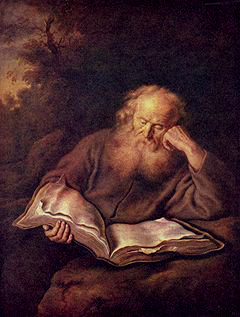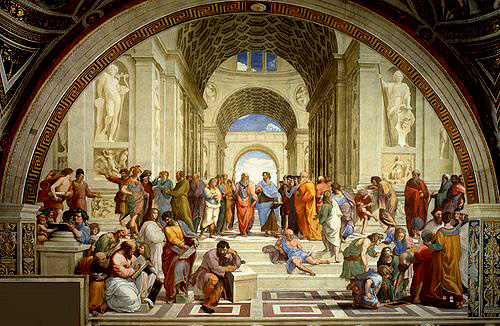Ralph Waldo Emerson (1803–1882)
There is a time in every man's education when he arrives at theWhy does Emerson make such a sweeping generalization here? How might the tone of this text have changed if he had written "in some men's education"? convictionfirm belief that envy is ignorance; that imitation is suicide; that he must take himself for better, for worse, as his portion; that though the wide universe is full of good, no kernel of nourishing corn can come to him but through his toil bestowed on that plot of ground which is given to him toWhy does Emerson make such a sweeping generalization here? How might the tone of this text have changed if he had written "in some men's education"? tillplow land to get it ready for seeding. The power which resides in him is new in nature, and none but he knows what that is which he can do, nor does he know until he has tried. Not for nothing one face, one character, one fact, makes much impression on him, and another none. This sculpture in the memory is not without preestablished harmony. The eye was placed where one ray should fall, that it might testify of that particular ray. We but half express ourselves, and are ashamed of that divine idea which each of us represents. It may be safely trusted as proportionate and of good issues, so it be faithfully imparted, but God will not have his work made manifestapparent by cowards. A man is relieved and gay when he has put his heart into his work and done his best; but what he has said or done otherwise, shall give him no peace.Put this idea into your own words. What is Emerson saying here? It is aHere, Emerson is saying that a lack of good work is like a promise that is only half kept. In not completing heartfelt work, person does not live up to his or her potential genius. deliverancesalvation; liberation which does not deliver. In the attempt his genius deserts him; no muse befriends; no invention, no hope.Here, Emerson is saying that a lack of good work is like a promise that is only half kept. In not completing heartfelt work, person does not live up to his or her potential genius.
 The Hermit, by Salomon Koninck
The Hermit, by Salomon Koninck
"In the attempt his genius deserts him; no muse befriends; no invention, no hope."
Trust thyself:How does this command demonstrate Emerson's belief in the importance of the individual? every heart vibrates to that iron string. Accept the place the divine providence has found for you, the society of your contemporaries, the connection of events. Great men have always done so, and confided themselves childlike to the genius of their age, betraying their perception that the absolutely trustworthy was seated at their heart, working through their hands, predominatingleading in all their being. And we are now men, and must accept in the highest mind the same transcendent destiny; and not minors and invalids in a protected corner, not cowards fleeing before a revolution, but guides, redeemers, and benefactors, obeying the Almighty effort, and advancing on Chaos and the Dark.
. . . Society everywhere is in conspiracy against the manhood of every one of its members. Society is aDoes Emerson seem to approve or disapprove of society in this metaphor? joint-stock companya business in which members own shares of the company, and all members are responsible for the company's debts, in which the members agree, for the better securing of his bread to each shareholder, to surrender the liberty and culture of the eater.Does Emerson seem to approve or disapprove of society in this metaphor? The virtue in most request is conformity. Self-reliance is its aversionan object of dislike or repulsion; a feeling of dislike or repulsion. It loves not realities and creators, but names and customs.
Whoso would be a man must be a nonconformistone who refuses to abide by established norms and customs. He who would gather immortal palms must not be hindered by the name of goodness, but must explore if it be goodness. Nothing is at last sacred but the integrity of your own mind. Absolveto pardon; to release from blame you to yourself, and you shall have the suffragevote of the world. I remember an answer which when quite young I was prompted to make to a valued adviser, who was wont to importuneto bother; harass me with the dear old doctrines of the church. On my saying, What have I to do with the sacredness of traditions, if I live wholly from within? my friend suggested,--"But these impulses may be from below, not from above." I replied, "They do not seem to me to be such; but if I am the Devil's child, I will live then from the Devil." No law can be sacred to me but that of my nature.What aspect of transcendentalism is demonstrated in this paragraph? Good and bad are but names very readily transferable to that or this; the only right is what is after my constitution, the only wrong what is against it. . . .
